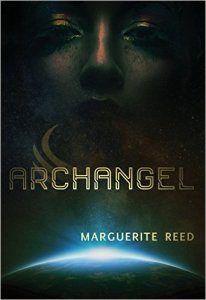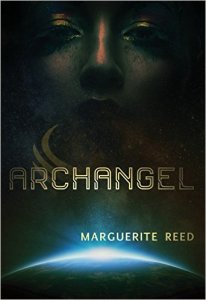Ysabeau Wilce reviews Marguerite Reed
Archangel, Marguerite Reed (Arche Press 978-1630230111, $16.00, 298pp, tp) May 2015. [Order from Resurrection House/Arche Press]
 Though Archangel, Marguerite Reed’s debut SF novel, may begin with the warning ‘‘This is not Eden,’’ the planet Ubastis certainly seems that way to those not privileged enough to live there. Earth, exploited and exhausted by human greed, is dying. The space colonies are crowded and miserable. To the desperate, Ubastis is the future, but in an effort to avoid mistakes made on Earth, immigration has been curtailed until the planet can be fully studied and a resource plan implemented. This study is paid for in part by expeditions to hunt native animals led by one of the xenobiologists sent to study them: Vashti Loren. Mercurial, brash, and headstrong, Vashti is the moral center of Archangel, the self-described Archangel Michael of Ubastis, who will do anything necessary to protect the planet from enemies both within and without. The other scientists and colonists on Ubastis have been enhanced, genetically tinkered with to erase undesirable human traits: Vashti is a ‘‘natch,’’ a natural, and the only person on Ubastis with a license to kill, and the will to do so.
Though Archangel, Marguerite Reed’s debut SF novel, may begin with the warning ‘‘This is not Eden,’’ the planet Ubastis certainly seems that way to those not privileged enough to live there. Earth, exploited and exhausted by human greed, is dying. The space colonies are crowded and miserable. To the desperate, Ubastis is the future, but in an effort to avoid mistakes made on Earth, immigration has been curtailed until the planet can be fully studied and a resource plan implemented. This study is paid for in part by expeditions to hunt native animals led by one of the xenobiologists sent to study them: Vashti Loren. Mercurial, brash, and headstrong, Vashti is the moral center of Archangel, the self-described Archangel Michael of Ubastis, who will do anything necessary to protect the planet from enemies both within and without. The other scientists and colonists on Ubastis have been enhanced, genetically tinkered with to erase undesirable human traits: Vashti is a ‘‘natch,’’ a natural, and the only person on Ubastis with a license to kill, and the will to do so.
That is until Vashti’s friend, the quixotic wife of the governor of the capital of Ubastis, smuggles a Beast – a BioEngineered ASault Tactician, a created super soldier – down to the planet’s surface. Contraband and considered non-human, the Beast inspires horror and loathing in Vashti. Years before, a different rogue Beast murdered her beloved husband, the father of her daughter. First determined to kill the Beast, Vashti soon finds herself forced into an uneasy alliance with the renegade soldier, who hopes that he and his brothers Beasts, outlawed in the Commonwealth, can find a haven on Ubastis. Their common enemy: those who see Ubastis only as a commodity to be exploited. Every ten years a popular vote is held to determine if Ubastis will be opened for immigration. A new vote is coming up and the clamor for colonization is growing louder and louder, but Vashti is not going to let Ubastis be exploited without a fight.
Archangel contains all the requisite trappings of SF: space travel, an alien planet, augmented humans, and exofauna, but it uses those trappings elegantly, as elements of the story, not the story itself. There’s a certain sameness to much science fictional worldbuilding, but there is no sameness here. Reed has created a world brimming with luscious detail, described in precise, yet lyrical, writing. She puts as much thought into the human habitat of Ubastis as into its exobiology, outlining a community based in the responsibility of citizenhood and cooperation, rooted in Middle Eastern and Southeast Asian culture. A scene in which Vashti and her big game clients toast their hunt with glasses of rare olive oil, too valuable to be used for anything other than medicine or a luxury libation, is just one example of the worldbuilding that Reed does so well. Archangel is full of such delightful flourishes. Vashti herself is a fascinating character; equally at home shooting a high-powered rifle at a charging Skeggoxus cyanus as she is changing the pee-soaked bedding of a three-year-old. She is both hunter and mother, killer and giver of life, as independent as her biblical namesake. Pleasingly, Vashti’s motherhood is not a mere plot point, but an integral part of her character; her interactions with her daughter show a private tenderness that her public persona dares not display. Against the backdrop of interplanetary skullduggery, the relationship between Vashti and the Beast quickly evolves into the familiar trope of a romance: she hates him for what he is; he loved her the moment he first saw her; and her antipathy masks a longing for connection. At times the plot deviates from political intrigue to follow the strictures of a romance novel. To make too much of this is to risk selling Archangel short. It is not a romance in space, but rather a thoughtful exploration into colonization, humanity, survival, desire, and responsibility, with a romantic element woven in. But the romantic element is there, and because the book is as much about Vashti – the narrator – as it is about Ubastis, this romantic element looms large and must be noted.
Archangel packs a lot into 300 pages. Its deepest flaw lies in that very complexity. There are so many ideas, so much happening, and so many details that the reader can easily be flooded. The implications of dramatic events are not always fully explored. One plot reveal in particular seemed much too serious to be tossed away so quickly – but better to have too much than not enough; all of these edges can be smoothed away as the series continues. Happily, Archangel does not stand alone. The book ends upon the edge of revolution. The upcoming Legion will continue Ubastis – and Vashti’s – story, and, undoubtedly, cement Marguerite Reed’s position as a writer to watch out for.




